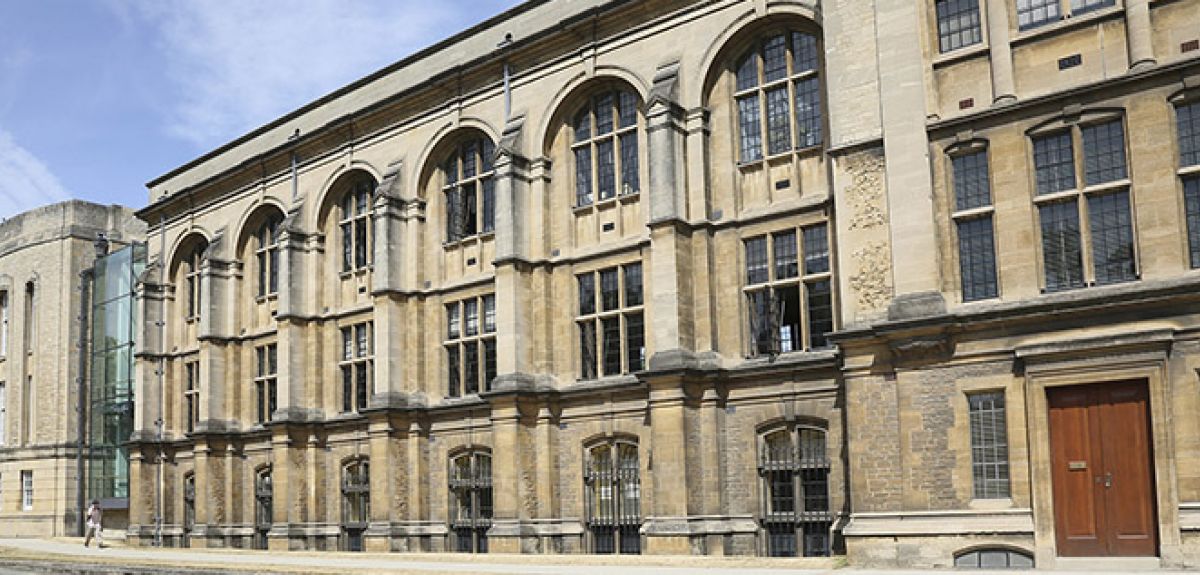
Credit: Bodleian Libraries, University of Oxford
Oxford unveils plans for new graduate college
The University of Oxford today announces initial proposals for the location, character and provisional leadership of a new graduate college.
It is anticipated that a majority of students will be drawn from departments across the Division of Mathematical, Physical and Life Sciences – but other disciplines will also be represented. The 21st century academic community will enjoy a central Oxford location and a vibrant scholarly, sporting and cultural life.
The new college will occupy the historic Radcliffe Science Library site on Parks Road, whose signature building was constructed in 1901 to a design by the renowned architect Sir Thomas Jackson. Jackson’s other works at Oxford include the Examinations Schools, the celebrated Bridge of Sighs at Hertford College, much of Brasenose College and Somerville College, and the former Oxford High School for Boys, which today houses the Faculty of History.
Outstanding graduate education which deepens the connection between students and their supervisors, promotion of inter-disciplinary exchanges, imaginative public engagement, and access to the Bodleian Library’s world-renowned scientific collections and the Bodleian Libraries and University museums exhibitions will be essential elements of the College’s ethos. Interaction between the disciplines will be aided by recruitment of post-doctoral researchers and graduate students working on two major challenges – Artificial Intelligence (AI) and Machine Learning, and Environmental Change.
The Vice-Chancellor of the University of Oxford, Professor Louise Richardson, has invited Prof Lionel Tarassenko CBE FREng FMedSci provisionally to become Head of House, to oversee development of the new college/society, and present proposals to Council and Congregation. Professor Tarassenko, who currently leads the Department of Engineering Science at Oxford, is a world-leading expert in the application of signal processing and machine learning to healthcare. As well as being the founder director of four technology companies spun out from the University, he has chaired the institution’s Information Technology Committee and served as both a member of the University Council and board director of Oxford University Innovation. A graduate of Keble College, he spent nine years as a Tutorial Fellow of St. Hugh’s College, and has been a Professorial Fellow of St. John’s College since 1997, which included service as Vice-President in 2011-2012. He is an Honorary Fellow of both Keble and St Hugh’s Colleges.
Professor Richardson said: 'Lionel Tarassenko was the driving force behind Oxford’s Institute of Biomedical Engineering, in which he also established a Centre of Excellence in Medical Engineering. The Institute was awarded the Queen’s Anniversary Prize in 2014 for success in forging collaboration between engineering and medicine. He is indefatigable in translating ideas into practical impact and in bringing smart people together. A committed researcher and teacher, Lionel has supervised more than 60 doctoral students and is superbly qualified to lead Oxford’s 39th college.'
It is proposed that the college will start recruiting 200 graduate students in 2019-2020 for admission in September 2020. Entrepreneurs-in-residence will stimulate interaction between members of the college, investors such as Oxford Sciences Innovation (OSI) and those already running innovative businesses in Oxfordshire. Twelve AI companies have spun out from departments in the Division of Mathematical Physical and Life Sciences at Oxford University in the last 3 years.
Professor Lionel Tarassenko said: 'Much of 21st-century research is interdisciplinary. Many of the scientific discoveries of the last 50 years, like the discovery of the structure of DNA, were made at the interface between the physical and life sciences. My own field of research, machine learning, intersects with philosophy, ethics and neuroscience. Progress on issues such as climate change and the loss of biodiversity is being made at the nexus of the physical, natural and human behavioural sciences. Exciting research occurs at the boundaries between disciplines. Oxford’s new college will harness diverse expertise, bringing together researchers who have curiosity beyond their own subject in common. It will be an immense privilege to lead this new project.'
Establishment of the new college responds to priorities stated in Oxford’s latest strategic plan, which aims – by 2023 – to increase postgraduate taught students by up to 450 a year, and postgraduate research students by up to 400 a year, while maintaining quality. The University was ranked the world’s overall number one university for a third successive year in the 2019 Times Higher Education World University Rankings. The world-class research carried out by academic staff, post-docs and graduate students has been a major contributor to this outcome, and Oxford is committed to attracting growing numbers of high-quality graduate students to help sustain its success.
An extensive programme of refurbishment, undertaken in partnership with the University’s Gardens, Libraries and Museums Division, will incorporate modern library facilities open to all graduate students together with an integrated museums collection centre in the basements. There will be fresh spaces for communal dining, collaboration, exhibitions and public events. The new college will integrate this with its interdisciplinary research, teaching and enterprise.
Professor Anne Trefethen, Pro-Vice-Chancellor for Gardens, Libraries and Museums, said: 'The University of Oxford is fortunate in holding some of the world's most significant collections. They provide extraordinary opportunities for scholarly enquiry, and represent a ‘front door’ to the wealth of our knowledge and research. For our revitalised library to share its home and everyday life with Oxford’s newest college is a wonderful expression of the commitment to engage broad audiences with our work.'
One essential attribute of the proposed college is yet to be considered – its name.
 Expert Comment: Four years of full-scale war and Ukrainian resistance continues
Expert Comment: Four years of full-scale war and Ukrainian resistance continues
 Oxford and Liverpool join forces to tackle global challenges
Oxford and Liverpool join forces to tackle global challenges
 Chancellor of Oxford University hosts special honorary degree ceremony
Chancellor of Oxford University hosts special honorary degree ceremony
 New research shows high temperatures affect sex ratios at birth
New research shows high temperatures affect sex ratios at birth
 COVID-19 vaccination during pregnancy offers new insight into preeclampsia prevention
COVID-19 vaccination during pregnancy offers new insight into preeclampsia prevention